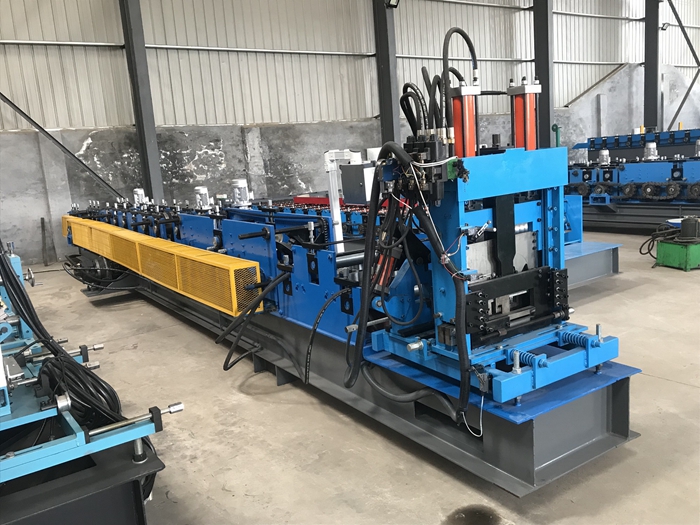Factories Specializing in Sheet Metal Roll Forming Machinery Production and Innovation Solutions
Sheet Metal Roll Forming Machines Revolutionizing Manufacturing
Sheet metal roll forming machines are vital in modern manufacturing, particularly in industries such as construction, automotive, and appliance fabrication. These machines transform flat sheets of metal into specific shapes with precision and efficiency, making them indispensable tools for factories worldwide.
The Basics of Roll Forming
Roll forming is a continuous bending operation in which a long strip of metal is rolled through a series of forming stations. Each station progressively shapes the metal until it reaches the desired profile. The consistent pressure applied by the rollers ensures uniformity in thickness and dimensions. This method can produce a wide variety of shapes, including channels, angles, and complex profiles that are used extensively in various applications.
One of the key advantages of roll forming is its ability to process high volumes of material quickly. Unlike traditional metalworking techniques, which may involve cutting, welding, or machining, roll forming is a continuous operation that minimizes waste and maximizes efficiency. Moreover, the process can be easily automated, reducing labor costs and turnaround times for production.
Types of Sheet Metal Roll Forming Machines
Factories utilize several types of roll forming machines, each designed for specific applications. Common types include
1. Standard Roll Forming Machines These are used for creating basic shapes such as channels and angles. They typically consist of several roll stations, each progressively shaping the metal.
2. Precision Roll Forming Machines These machines are equipped with advanced technology to create highly precise and intricate profiles, crucial for industries where dimensional accuracy is paramount.
3. Structural Roll Forming Machines Designed to produce large sections such as beams and columns, these machines handle heavier gauges and larger profiles.
sheet metal roll forming machines factories

4. Custom Roll Forming Machines Many factories invest in custom-built machines tailored to specific product requirements, allowing for unique designs that meet niche market demands.
The Manufacturing Process
The roll forming process begins with the selection of the metal sheet, which can be made from materials like steel, aluminum, or copper. After cutting the metal to the desired length, it is fed into the machine. The rollers, arranged in a sequential pattern, gradually shape the metal. The process is continuous, with the formed profile exiting the machine at high speeds.
Quality control is a critical aspect of manufacturing with roll forming machines. Factories often implement real-time monitoring systems to ensure consistency in product dimensions and strength. Advanced sensors and feedback systems can automatically adjust the machines, reducing waste and increasing overall efficiency.
Benefits of Sheet Metal Roll Forming
The advantages of sheet metal roll forming machines are numerous. Firstly, they offer high production rates, making them suitable for mass production. Secondly, they are highly efficient, resulting in minimal material waste. This sustainable approach is particularly important in today’s manufacturing landscape, where environmental concerns are paramount.
Moreover, roll-formed products often exhibit superior strength-to-weight ratios compared to those produced by other methods. This characteristic is especially advantageous in industries like automotive manufacturing, where lightweight components can enhance fuel efficiency. The ability to create complex shapes also allows for innovative designs, giving companies a competitive edge in the marketplace.
Conclusion
In summary, sheet metal roll forming machines play an essential role in modern manufacturing. Their ability to produce high volumes of precise components efficiently makes them invaluable to various industries. As technology continues to advance, we can expect even greater innovations in roll forming, further transforming how factories operate and produce quality metal products. Whether it’s constructing the latest car model or building infrastructure, roll forming machines are at the forefront of manufacturing excellence.
-
Top Drywall Profile Machine Models for SaleNewsJun.05, 2025
-
The Role of Purlin Machine in Modern Structural BuildingNewsJun.05, 2025
-
The Advantages of Investing in a Metal Roof Sheet Making MachineNewsJun.05, 2025
-
Key Features of Hydraulic Bending MachineNewsJun.05, 2025
-
Innovations in Standing Seam Metal Roof Machine TechnologyNewsJun.05, 2025
-
High - Performance Roof Panel Machine for SaleNewsJun.05, 2025
-
Key Features to Look for in a Roof and Wall Panel MachineNewsMay.23, 2025








